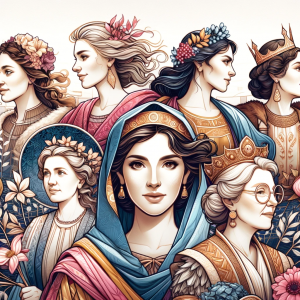Characters of the Bible (6of6)

Lesson 6: Women of the Bible: Their Roles and Teachings
Introduction: This lesson highlights the significant roles and teachings of various women in the Bible, examining their influence and contributions to biblical narratives.
Relevant Information:
- Key Figures: Sarah, Rebecca, Rachel, Leah, Ruth, Esther, and others, each of whom played pivotal roles in biblical events.
- Diverse Roles: From matriarchs to prophetesses and queens, these women displayed faith, courage, and wisdom.
- Unique Perspectives: The stories of these women offer insights into the societal and spiritual dynamics of their times.
Story:
Summary Stories of Sarah, Ruth, and Esther
Sarah’s Journey with Abraham
Sarah, initially named Sarai, was the wife of Abraham. She embarked on a journey of faith alongside Abraham when God called him to leave his homeland for an unknown destination. As a matriarch, Sarah faced several challenges, including her initial barrenness. Her faith was tested, especially when God promised her a son in her old age (Genesis 18). Despite her skepticism, she gave birth to Isaac, playing a vital role in the establishment of the Israelite people. Sarah’s story is one of patience, faith, and resilience, as she navigated the complexities of her role as a matriarch in a nomadic and often uncertain life.
Ruth’s Loyalty and Lineage
Ruth, a Moabite woman, is known for her remarkable loyalty and devotion. After the death of her husband, Ruth chose to stay with Naomi, her Israelite mother-in-law, saying, “Where you go, I will go; where you stay, I will stay. Your people will be my people and your God my God” (Ruth 1:16). Ruth’s commitment led her to Bethlehem, Naomi’s homeland, where she gleaned in the fields of Boaz, a relative of her late husband. Ruth’s dedication and kindness won Boaz’s admiration, and he took her as his wife. Their union placed Ruth in the lineage of David and, ultimately, in the genealogy of Jesus Christ, as detailed in the Gospel of Matthew. Her story is a powerful testament to loyalty, love, and God’s providential care.
Esther’s Courageous Act
Esther, a Jewish woman who became the queen of Persia, is celebrated for her bravery in saving her people. When a royal decree threatened the Jews in Persia, Esther, encouraged by her cousin Mordecai, bravely approached King Xerxes without being summoned – an act that could have led to her death. She revealed her Jewish identity and pleaded for her people. Esther’s clever strategy included hosting banquets for the king and Haman, the royal advisor who plotted against the Jews. Her courage and wisdom led to the king’s favor, the foiling of Haman’s plot, and the issuance of a new decree allowing the Jews to defend themselves. Esther’s story is one of courage, strategic thinking, and risking personal safety for the greater good of her people.
- Sarah’s journey with Abraham and her experience as a matriarch (Genesis 18).
- Ruth’s loyalty and her role in the lineage of David (Book of Ruth).
- Esther’s courage in saving her people (Book of Esther).
Discussion Points with Possible Answers:
- What can we learn from the stories of Sarah, Rebecca, and Leah?
- Insights into faith, family dynamics, and the experiences of matriarchal figures.
- How do Ruth and Esther demonstrate leadership and faith?
- Ruth exemplifies loyalty and compassion, while Esther shows bravery and strategic wisdom in a time of crisis.
Related References for Study:
- Genesis, Ruth, Esther: Primary texts detailing these women’s stories.
- “All of the Women of the Bible” by Edith Deen: A comprehensive exploration of women’s roles in the Bible.
- Proverbs 31: A poetic tribute to a woman of valor, reflecting the virtues of a godly woman.

